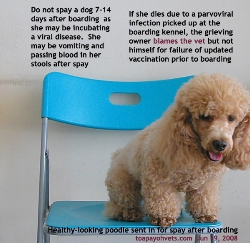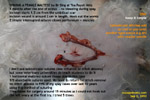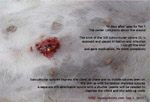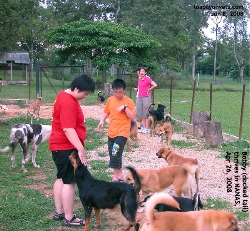"I have taken the cab to get my dog spayed today," the owner was reluctant to postpone spaying of her dog brought straight from the boarding kennel to the vet surgery. "I starve the dog since 8 p.m yesterday and she had no water since 8 p.m."
"The poodle has no fever. She was boarded for the past 2 weeks with no medical complaints except for barking a lot. I wish to spay her on the 2nd day after return from the boarding kennel," the owner had not much spare time.
"Viral diseases take 7-10 days to show symptoms if the poodle had been infected. The poodle looked healthy now. She has a good appetite but the disease like parvoviral infection of her gut shows up 7-14 days after boarding. If she dies due to the viral infection, you will not be happy and most likely blame the vet."
The lady was hesitant and phoned her nephew to communicate with me. Incubation period and viral diseases in a healthy looking poodle 7-14 days after the viral incubation period --- such technical matters are best referred to her nephew.
The nephew understood what I said and decided to wait for 7 days. Give what the customer wants should be the objective of any service provider. If not, the customer goes to the competition.
However, should the dog not be fully protected against the parvoviral disease, the signs and symptoms of bloody diarrhoea and vomiting would appear after spaying. When the dog dies a few days after spay as the parvovirus shows its damage of the intestines by bleeding diarrhoea, the vet gets blamed for her demise.
As the lady was not in favour of taking the dog back, she spoke to her nephew again.
I told her that she has to accept the risk if the dog dies of parvoviral disease due to viral infections from the boarding kennel. Although the dog was vaccinated, nobody could tell whether she was harbouring the parvoviral virus with no presenting symptoms for the early stage of the infection as the vaccination may not be sufficient to protect the dog.
If the lady wants to take the risk, it is best practice for the vet to get her acknowledgement of the risk in writing. Singapore is becoming a litigious society, so writing is best evidence if the parvoviral infection kills the dog.
 |
|
By not spaying the dog after boarding as required by the owner, the vet may just lose the case to the competitor as in this case |
I am writing from one experience
in 2008.
A black
cross bred was brought in for spaying. I
assumed she was from the home as almost all
cases of spay originated from the home.
3
days after the spay, the dog had bloody
diarrhoea. Blood could not stop flowing from
her rectum. A faecal parvoviral check
indicated parvoviral infection. She
died in the next 4 days. On further
questioning, the dog had been to a boarding
kennel around 1 week ago.
The owner was not happy although he knew
that the bloody diarrhoea had nothing to do
with spaying of the dog.
He complained to
one breeder who told me and had told him off
for not vaccinating prior to boarding.
Cross-breds in Singapore are
seldom vaccinated in the first place. In
this case, the vaccination was not updated
and no annual vaccination had been done.
Although there was no litigation or
complaint to the veterinary authorities, the
vet ought to be careful as any complaint
takes up valuable professional time.
It
is important for the vet to ask whether the dog
has been boarded recently as the parvovirus
is commonly found where dogs and puppies are
boarded in large numbers.
For the past 30 years, there was no such
incidents of parvoviral bloody diarrhoea in
dogs after spay or neuter.
The death of one adult dog due to
parvovirus after spaying was a very rare
case. But the parvovirus has become
much more common in Singapore's breeding,
pet shops and boarding kennels in recent
years compared to 10 years ago as more
breeders set up shop as Singapore develops.
Demand for puppies has gone up compared to
10 years ago.
In this poodle, the owner had stated that
her dog had just come home from boarding.
 I was glad that the lady took the poodle
home. Sometimes it is better to lose a
client to competitors than to risk losing
the dog due to parvoviral infection or
stress by spaying immediately after
boarding. Death in a dog at the Surgery can
never be forgotten by the owner and his
family and bad mouthing of the vet is
usually the case. So it is best practice not
to sterilise a dog 7-14 days after
boarding. In the case of the poodle sent
home, the owner did not return to get her
dog spayed by me.
I was glad that the lady took the poodle
home. Sometimes it is better to lose a
client to competitors than to risk losing
the dog due to parvoviral infection or
stress by spaying immediately after
boarding. Death in a dog at the Surgery can
never be forgotten by the owner and his
family and bad mouthing of the vet is
usually the case. So it is best practice not
to sterilise a dog 7-14 days after
boarding. In the case of the poodle sent
home, the owner did not return to get her
dog spayed by me.
 TOA
PAYOH VETS
TOA
PAYOH VETS



